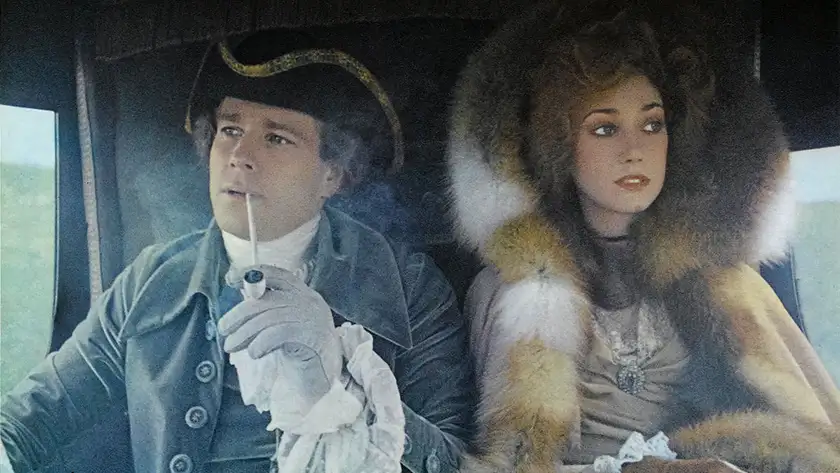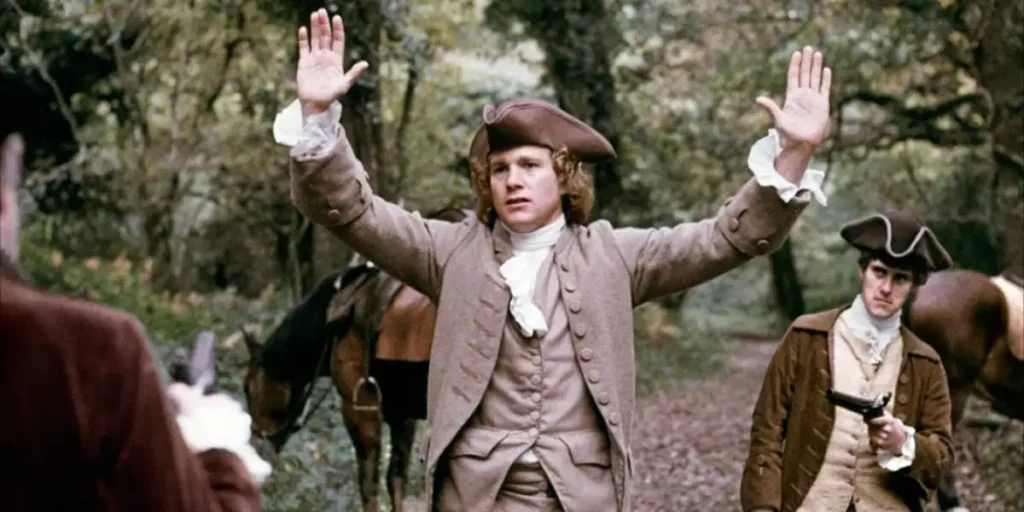Barry Lyndon fuses groundbreaking technicality with Stanly Kubrick’s profound humor, proving itself worthy to be called one of the director’s best films.
Barry Lyndon is a sick joke masquerading as an epic period piece. In other words, it’s another Stanley Kubrick masterpiece. In this 1975 film, Kubrick utilizes beautiful scenery and groundbreaking cinematography as a vessel to comment on the inherent silliness of human nature, our worst tendencies, and the horrible things we are willing to do to achieve power and personal satisfaction. The final twist (and joke) of this 3-hour epic is Kubrick’s thesis that, in the end, none of it really matters.
The film, split into two distinct acts, follows Redmond Barry (later Barry Lyndon) as he attempts to climb the social hierarchy in 18th-century Europe. He engages in duels, fights in wars, cheats at cards, and romances several women (including his cousin in the film’s opening act). Ryan O’Neal tries to portray Barry as a somewhat-noble adventurer, but Kubrick paints his lead in an entirely different light: one that highlights the male ego and human depravity. Despite being the protagonist, Barry does very little to earn the audience’s sympathy, save for a few tender moments with his son in the film’s latter half. The movie’s first part (“By What Means Redmond Barry Acquired the Style and Title of Barry Lyndon”) depicts his rise. The second part (“Containing an Account of Misfortunes and Disasters Which Befell Barry Lyndon”) depicts his fall in a stunning, humorous (if unsettlingly so) fashion.
Some critics who dismiss the film seem to have missed Barry Lyndon’s cheeky, satirical tone, or feel that it isn’t more apparent. The epic scope of the film clashes with its ridiculous nature in the eyes of some of its detractors. However, Kubrick pulls off telling a grand, exciting story while also poking fun at his characters and the events they find themselves in. Many of the situations Barry finds himself in lead to laughs, including an early romance scene (again, with his cousin) and being the victim of a robbery (by two of the politest robbers).
Where Kubrick really makes his intentions known is in the often hilarious facial expressions of his characters. O’Neal swoons and stares his way through most of the movie, and the faces of the aforementioned robbers, a British officer wishing to court Barry’s cousin Nora Brady, and Lady Lyndon’s first husband are, for lack of a better term, extremely goofy. Careful observers can find much to point their fingers at in hysterical glee as Kubrick dismantles the idea of “being a gentleman.”

One thing most people who view Barry Lyndon can agree on is how beautiful the film looks. Kubrick and cinematographer John Alcott – who won an Oscar for the movie – did not use electric lighting for the indoor scenes, instead opting for candlelight and natural lighting. Almost every shot, but especially these indoor scenes, look like paintings from the era, drawing inspiration from painters like William Hogarth. Aside from the indoor scenes, the rest of the film looks just as spectacular, adding an overall sense of grandeur to the picture. Besides this innovation, Kubrick also pulls many of his familiar tricks to great effect, including “the Kubrick stare” and long tracking shots (One scene where a general walks through a building past several of his soldiers during a battle will remind savvy viewers of the famous tracking shot in Kubrick’s Paths of Glory). Great direction and cinematography can easily be taken for granted, but in the hands of a master director, they can add to an already impressive film.
Kubrick mixes his stellar direction, cinematography, performances, and screenplay to tackle important themes, and Barry Lyndon is no exception. Above all of the other themes presented here, the most prominent seems to be humankind’s inclination towards violence, and more particularly, how we try to cover our violent tendencies in a blanket of sophistication. The duels in Barry Lyndon have a strict set of rules, and war is fought in a particular, “dignified” fashion. Still, humanity is just one bad moment away from an explosion of violence. For Barry, this moment comes when his stepson, Lord Bullingdon (Leon Vitali) announces he is leaving the family estate because of his hatred for Barry. He attacks Bullingdon in crowded room, revealing his cardinal instinct. Even in “upper class” society, Kubrick suggests that man’s nature does not change. Barry’s treatment towards women, especially Lady Lyndon (Marisa Berenson) in the second act, further illustrates Kubrick’s view of human depravity.
Many characters seek “satisfaction” in Barry Lyndon. The final joke is that no one really receives any, and, even worse, none of the events that play out over the course of the film truly matter. Barry, after suffering a wound in the film’s final duel, is bound to crutches. The movie ends on a freeze frame of our titular “hero” struggling to climb into a carriage. A title card comes on screen, announcing, “it was the reign of George III that the aforesaid personages lived and quarreled; good or bad, handsome or ugly, rich or poor, they are all equal now.”
Kubrick’s final punchline is “all of these people are dead, and nothing they did truly mattered in the grand scheme of things.” The mention of George III is the first sign of any historical context, suggesting the battles and events that took place had little impact on history’s trajectory. It’s a rather pessimistic outlook, albeit one that Kubrick delivers in the most provocatively hilarious way possible. Other recent films have tried to replicate Barry Lyndon’s formula of blending these hilarious moments with an epic scale, to varying degrees of success. Looking back, I’m not sure how fully I got the joke the first time watching this masterpiece. The more I watch it, however, the more Kubrick’s full vision comes into clearer view. The movie is epic, gorgeous, hilarious, and ultimately hopeless.
Barry Lyndon is now available to watch on digital and on demand. Read our review of Stanley Kubrick’s The Shining and our list of films inspired by 2001: A Space Odyssey.

